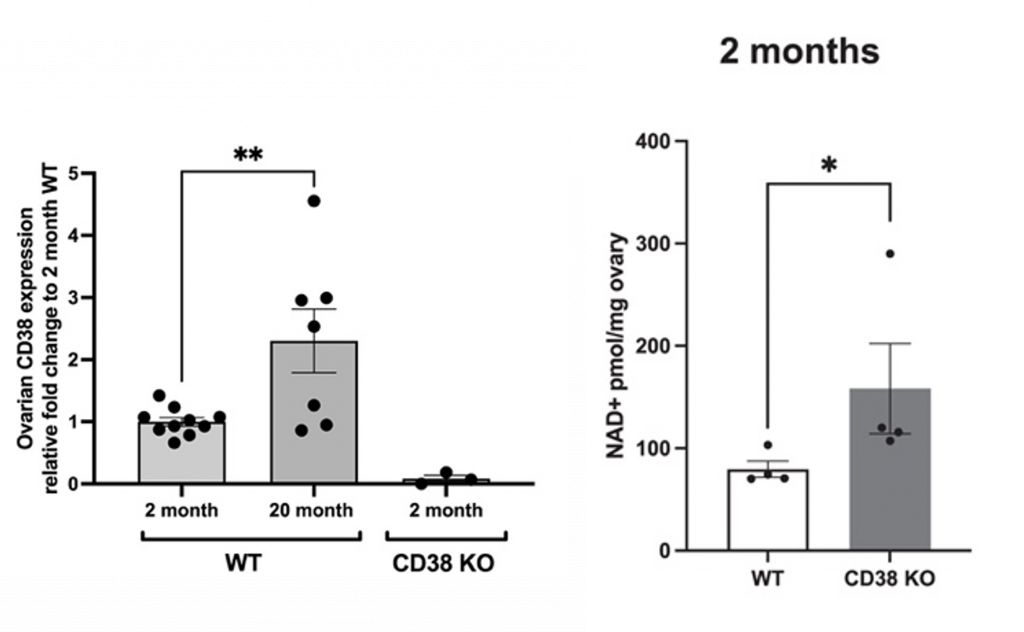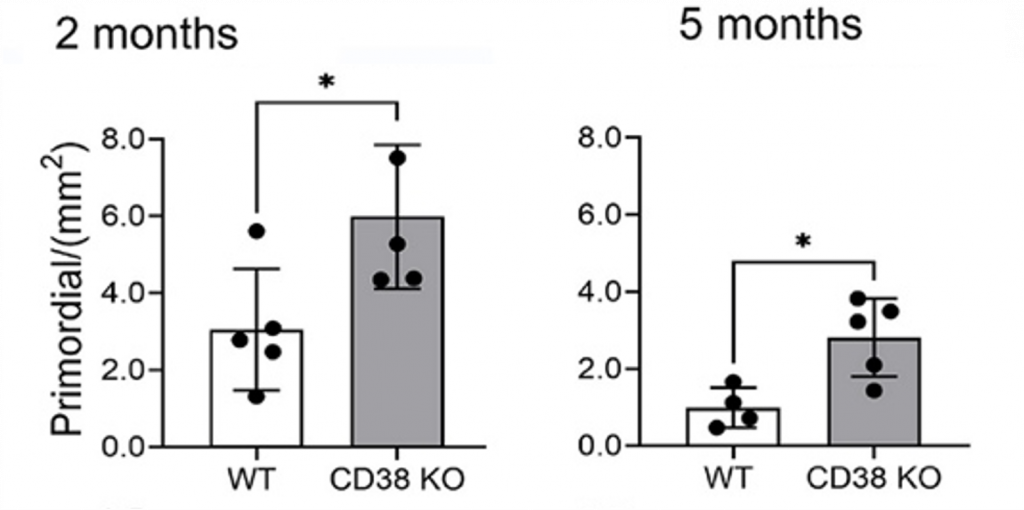Key Points:
- CD38 levels increase with age in the ovaries of mice while NAD+ levels decline.
- Elevated CD38 levels shorten the female reproductive lifespan by reducing the number of oocytes (eggs) in the ovaries.
- Higher CD38 levels reduce the number of offspring birthed by mice.
A woman’s reproductive lifespan is largely determined by her ovarian reserve — a finite number of oocytes that decreases with age. Declining oocyte numbers inevitably hampers fertility, which usually occurs during a woman’s late 30s. However, scientists from the Buck Institute in California believe that reproductive lifespan can be prolonged, which could also have positive effects on the overall lifespan of women.
“Studying ovarian biology and reproductive aging is not just about trying to increase fertility, but really about the overall health of females,” said Buck President and CEO Eric Verdin, MD, senior author of the study. “We want to understand the processes that lead to decreased fertility that are linked to menopause and therefore linked to overall lifespan and healthspan of women. This is a perspective shift that needs to happen.”
In the latest issue of iScience, Verdin and his team, including Rosalba Perrone, PhD, have uncovered key underlying biological features of ovarian aging. Perrone and colleagues show that an NAD+-depleting enzyme called CD38 increases with age in the ovaries of mice. Furthermore, removing this enzyme increases ovarian reserves and enhances fertility, demonstrating a potential extension of the reproductive lifespan.
Removing NAD+-Degrading Enzyme Slows Reproductive Aging
Scientists at The Buck Institute found that the ovaries of normal female mice showed a 2-fold increase in CD38 and a decrease in NAD+ with age. To further study the effects of CD38, Perrone and colleagues examined genetically engineered female mice deficient in this NAD+-degrading enzyme.
As expected, the ovaries of young CD38-deficient mice showed little to no increases in CD38. Furthermore, NAD+ levels were higher in the ovaries of CD38-deficient mice, suggesting that CD38 leads to decreased NAD+ levels in the ovaries.
“We saw that CD38 increases with age within the ovaries, which is the first time this has been shown,” said Dr. Perrone. “Discovering the missing link in the literature, showing that CD38 expression led to NAD+ decline, was the most exciting part [of the study].”

To evaluate ovarian reserve and reproductive lifespan, Perrone and colleagues measured primordial follicles — sacs in the ovaries that store oocytes. Both CD38-deficient and unaltered mice showed an age-related decline in the number of primordial follicles, but CD38-deficient mice had more follicles at younger stages of life. These findings suggest that removing CD38 could prolong the reproductive lifespan of females.

To assess fertility, Perrone and colleagues measured the number of offspring per litter and the total offspring across multiple litters. Overall, young CD38-deficient mice produced more offspring per litter and had more total offspring, revealing an association between increased follicle number and enhanced fertility.
“We were amazed to see that the increased number of primordial follicles was associated with more offspring, reinforcing the biological relevance of our observations,” said Dr. Perrone.

Modulating NAD+ to Slow Reproductive Aging
The findings of Perrone and colleagues suggest that elevating NAD+ levels, particularly in the ovaries could slow ovarian aging and promote fertility.
“We really made a step forward in understanding the role of NAD in ovarian function and how a female’s reproductive lifespan progresses,” said Dr. Perrone. “What makes this research exciting is demonstrating we can modulate NAD+ to affect fertility.”
Since CD38 lowers NAD+ levels, supplementing with an NAD+ precursor like nicotinamide riboside (NR) or nicotinamide mononucleotide (NMN) may have similar effects to inhibiting CD38. Indeed, NR has previously been shown to slow ovarian aging in mice and NMN has been shown to do the same.
As mentioned, NAD+ can also be replenished by inhibiting CD38. Such an inhibitor includes an antibody called 78c, which has been shown to increase the lifespan of mice. Another CD38 inhibitor is cyanidin-3-O-glucoside (C3G), which occurs naturally in berries and other plant-based foods. Studies have shown that C3G helps to increase NAD+ levels and reduce inflammation, a hallmark of aging.